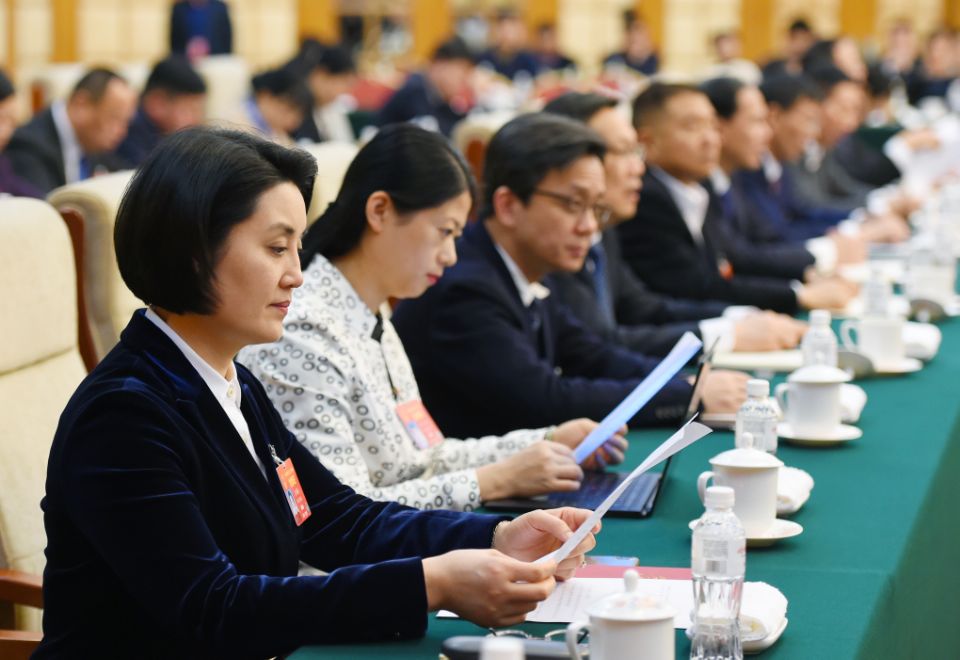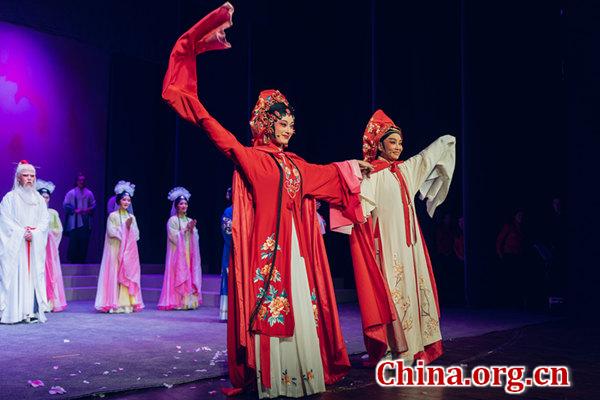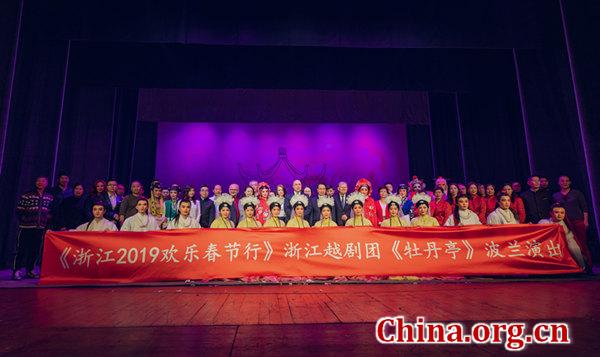NPC deputy dedicated to promote traditional Chinese opera
- By Zhang Liying
 0 Comment(s)
0 Comment(s) Print
Print E-mail China.org.cn, March 12, 2019
E-mail China.org.cn, March 12, 2019
To Wang Binmei, deputy head of the Zhejiang Yue Opera Troupe, working to maintain the vitality of traditional Chinese opera is both her responsibility and life's passion.

Wang, a deputy to the 13th National People's Congress (NPC), said she was inspired by the task set in this year's government work report to see art and literature thrive and help boost people-to-people and cultural exchanges with other countries.
Sharing her views during the ongoing second session of the 13th NPC, the actress, who has been dedicated to the performance of Yue Opera for more than 30 years, said she was well aware of how important it was to preserve, promote and develop traditional Chinese opera as an essential part of the national culture.

Traditional Chinese classic amazed Poland
Wang told China.org.cn that international exchange is an effective way to introduce the genre to the world.
For example, the Yue Opera "The Peony Pavilion" was staged in Warsaw on Jan. 16, marking the start of Zhejiang Yue Opera Troupe's seven-day performance tour in Poland.
Wang said the applause during the curtain call lasted eight minutes, and a Polish official praised the performance as a Spring breeze blowing through his country.
Wang said that she hadn't expected the traditional Chinese classic could enjoy such great popularity with a Polish audience.
After more than a century of steady evolution, Yue Opera now features actresses in male roles, and is considered as China's second most popular performance style after the world-famous Peking Opera.
"The Peony Pavilion" is a romantic tragicomedy written by Tang Xianzu, a playwrite of the Ming Dynasty (1368-1644). It depicts a love story between Du Liniang and Liu Mengmei, who overcome numerous difficulties to finally get together.
Wang attributed the success of the Warsaw performance to the story, which shares many similarities with "Romeo and Juliet," as well as the performers' proficiency on stage.
"Great art can be appreciated by people around the world. Although we speak different languages, the audience can understand what we want to express through our singing, performing and staging," she stressed.
Wang said such exchanges provided a great opportunity to draw on the strengths of art forms of other countries, and improve themselves.

Local policies boost opera development
Wang said that Zhejiang, home to 18 local operatic genres, including Yue, Wu and Shaoxing Opera, attaches great importance to their preservation and development.
The provincial authorities issued dedicated plans and guidelines to promote their advancement, and allocates special funds of 16.2 million yuan each year to support innovative development.
The Yue Opera Art Festival, a quadrennial national event, has been held four times in Shaoxing, one of the cradles of the opera, greatly increasing its popularity and influence, Wang added.
She also applauded the public activities and international exchanges in recent years to promote traditional Chinese opera to schools, the countryside and onto a broader global stage.
However, the actress identified many challenges facing the development of traditional Chinese opera, such as a lack of innovation in themes, shrinking audience numbers and a shortage of performers, especially young ones.
More measures needed for improvement
Wang said that efforts on various fronts should be stepped up, such as fresh opera creation, financial support and reform of the management mechanism, in order for traditional opera to gain stronger vitality.
She suggested opera composers and performers keep abreast of the times and engage more closely with the people to deliver more works of contemporary relevance. Also, more investment was needed for promotion activities.
For example, Wang said the Zhejiang Yue Opera Troupe planned to create some Yue Opera plays based on ancient Chinese poems and promote them to elementary schools in the province, a project which is requiring more financial support.
She emphasized the role of talent in developing traditional Chinese opera, suggesting reforms in the management mechanism and the income distribution system of state-owned opera troupes to attract and retain excellent opera performers.
It was also imperative to integrate traditional Chinese opera with other sectors to expand the promotion channels. "For example, we are making animated opera films in collaboration with the Central Academy of Fine Arts, in the hope of showcasing the charm of tradition Chinese opera in a more vivid way," she added.






Go to Forum >>0 Comment(s)